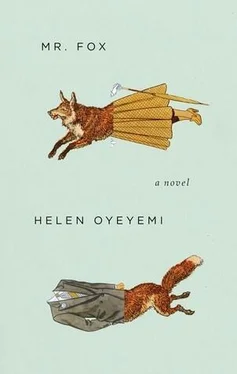“Bold,” I said, accepting the card.
He touched my wrist. Lightly, and with just one finger, but I shivered. It wasn’t that his hand was especially cold. I think it was the subtlety. If I hadn’t been looking, I wouldn’t have even noticed what he’d done. He took my pulse, I thought. Stole it.
“Too bold?”
He walked away from me, backwards.
I didn’t know how to answer. I think I just shrugged awkwardly and turned away.
I don’t do anything I don’t want to do. Not even for curiosity’s sake.
For example: There’s the time I went to Berlin to see a man I liked, a stage magician I’d done a shoot with to promote something or other. The visit went badly. I’d turned up at his door as a surprise, and he didn’t like surprises. If I’d thought about it I would have realised that — a magician must control his props and the space in which he orchestrates his tricks — it looks like play, but the magician’s mind must be as strict as an iron brace. We went for a walk and he told me that I didn’t make much sense to him outside of the photographs. He seemed to be trying to tell me that I was a creature of chaos. I said, “Okay, I’ll go home today.”
The magician said, “Thank you for understanding.” He turned homewards and I stood still.
“Aren’t you coming?”
“No, I’m going home.”
“But your things—”
“Throw them away. I’ll get new things. There are so many, all around.”
“You’re angry.”
“I’m not. I swear I’m not.” I really wasn’t angry. I did want him to go away, though, and quickly, so that I could begin to forget about him. So I smiled, and hugged him, to show that I wasn’t angry. He left, calling after me that I should phone him if I changed my mind about picking up my things. I kept walking. Under a bridge in Prenzlauer Berg I came across a man playing a violin; he was wearing a top hat and dinner jacket, and his notes were apple crisp. Because he was playing so well I looked at him. At first I thought my sight was sun-spattered, but once my eyes adjusted to the tunnel I saw that the scars were really there — harshly moulded welts that gripped half of his face. They crowded his left eye, forced its corner to travel down with them. I stopped walking.
“Wunderbar,” I said. “Wo hast du gelernt?”
He didn’t change the pace of his playing. Nor did he look up.
“Schläfst du hier?”
No answer. Sunset lanced through the tunnel, cutting our shadows off at the knees. I found my purse, took out a note, and let it flutter into his violin case. I liked his indifference. I respected it. He finished his piece and packed up his violin, shaking the money out of the case first. It blew away, but I stomped and trapped it under my foot, still watching him, wondering, I suppose, if he would acknowledge me before leaving. “If you want to talk to me you can talk to me,” he said, as he snapped his case shut. “But not here.”
And he leapt to his feet and sprinted away, through the tunnel and across the smooth lawn of the park, through the rose-covered trellises that flanked its gates. He crossed over concrete and, at a mad, desperate dash, through the traffic that whirled along a broad avenue. And I followed, chased briefly by my flying ten-euro note, colliding with pedestrians, knocking handbags off shoulders and newspapers from people’s hands. The violinist’s hat fell off his head, and I picked it up and ran harder, shouting “Entschuldigung!” and shaking it joyfully. Near the end of a dimly lit alleyway my quarry knocked on a door in a complicated manner — a series of knuckle raps and openhanded slaps — was abruptly admitted, and tumbled inside. I drew the line at that. I approached the door, which looked like any other door, and placed the top hat to the left of it. Then I went off in search of something to eat. The running had made me hungry. I hope he recovered the top hat — it wasn’t a cheap one.
I’ve wondered, I have wondered, what that chase was all about, but I’ve never regretted leaving the matter at that. I didn’t want to follow the violinist into the company of persons unknown to me. So I didn’t do it.
I decided that I would not be calling S. J. Fox — there was something married about him. So I left his business card in the back of the taxi. I’ve left purses and cameras and mobile phones in the backs of taxicabs and have never once been called back to collect them before the cab drove off. This time the driver called out, “You’ve forgotten something, miss,” and I had to go and pick the business card up.
I liked to go home. I’d worked hard on the place, repainting a room a month, stencilling bright butterflies in corners, building little galaxies of light with crystal lampshades, pouring gauze over the windowpanes. There was no darkness where I lived.
I let myself in, picked my letters up off the doormat, and walked through two weeks’ quiet, the floorboards soft under my feet, a gentle path to my unmade bed. It looked storm-tossed, just the way I’d left it, just the way I liked it. I lay down, opened letters, and listened to my answer machine. There were hardly any messages. A couple from my agent, about jobs.
As I listened to the messages I looked at an invitation to a fancy dress party, really looked at it, held it close to my face. The words were printed alongside a picture of me, looking too silly for words. They’d done my hair up in Victorian ringlets and dressed me up in a grey wolf suit and a red cape. The snarling wolf’s head was hung around my neck, sharp teeth and bright gums. In the background there were soft multicoloured lights that were supposed to suggest fantasy and imagination. It was for charity. The party was due to start in an hour, and the venue wasn’t far from my flat — not by taxi. I could still go. It seemed wrong not to take a chance to meet people.
There was a shepherd’s crook leant up against my bathroom door — I’d got it on the Portobello Road a few months ago. I considered going to the fancy dress ball as a saucy shepherdess. Or Christ. Or I could go as a saucy shepherdess, and when people asked me if I was a shepherdess I could say “Christ, actually.”
I moved on to the last letter in the heap, the only one addressed to Miel Shaw. It was a dove-grey envelope addressed in thin, dark purple print. Which meant that it was from my father. I had one hundred and twenty-seven other envelopes like it, many of them unopened because they’d arrived on days when I knew I couldn’t cope. The letters were all in a shoebox under my bed. My hoard. I opened the new envelope little by little, sliding a nail along under its sealed flap, from one corner to the other. It took a long time.
The letter was upsetting, so I’ll try to paraphrase it. It had been written by someone else on his behalf — dictated, it seemed, and sent without editing. My father apologised for writing to me — he said he knew that I didn’t like him to. But he had been taken aside and told terrible things about what was happening inside his body. He was dying of colon cancer. He had gone through chemotherapy, and he was still dying. There was a smell in the air — a sweet smell that terrified him and was with him always. He thought it was coming from his stomach. He asked me to visit him at the prison hospice. You’ve never seen such a place, he said. You couldn’t know that a place like this exists. Come and see me. Just quickly, just once. Or if I telephoned, if I wrote back — just to show that I was there, that there was someone. He said that he’d seen me in a magazine but that I’d just been paint and porcelain. Are you really there? he asked. Are you?
I folded the letter, put it back in its envelope, and added it to the others in the box. I don’t care. I don’t care. He hadn’t put my name in the letter, and that made it easier for me to refuse the letter — it had not been written to me.
Читать дальше












